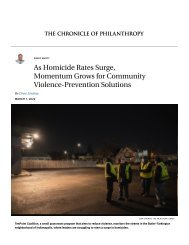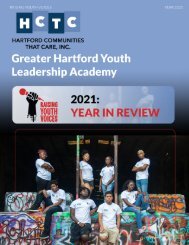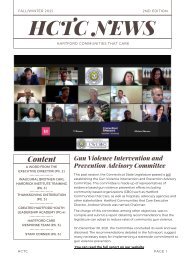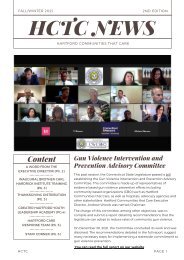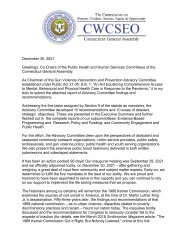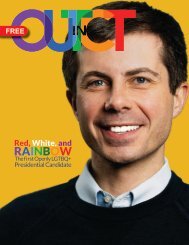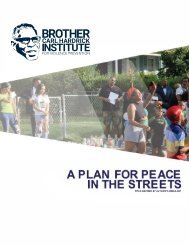HCTC 2021 Report
Create successful ePaper yourself
Turn your PDF publications into a flip-book with our unique Google optimized e-Paper software.
Overview
Hartford Communities that Care (HCTC) has been focused on
violence prevention and developing community relationships
since 1998. In this year of extremes, HCTC was able to draw upon
deep community connections to pursue not only its primary
mission, but also to address the dueling crisis of an overdue
national reckoning with the many inequitable systems of deepseated
racial injustice.
The HCTC umbrella covers four programs, each designed and
staffed as fully as possible to implement best practices with
measurable outcomes: The Hartford Care Response Team; the
CT HVIP Collaborative; the Greater Hartford Youth Leadership
Academy; and the Community Health Worker Program.
This report spotlights how each program
has adapted to address the festering public
health crisis of urban gun violence, even as
those painful conditions worsened with the
unfolding crises of COVID-19 and its economic
fallout.
In each program, HCTC in 2020 relied upon civic engagement and
advocacy, in partnership with government, private, and nonprofit
agencies here, statewide — and across the nation — to expand
services and broaden the scope of interventions on behalf of
unserved and underserved families, primarily young men of color.
Building coalitions has been a core HCTC strategy since its
founding. This year, pursuing our mission of preventing and
reducing community violence, we added Bridgeport StreetSafe
as a partner in our CT Hospital Violence Intervention Program (CT
HVIP) collaborative. Partnerships with our frontline counterparts
in New Haven deepened with several capacity building sessions.
At the same time, we continued to develop relationships within
Hartford and with key legislators, including Senator Douglas
McCrory, Speaker of the House of Representatives Matt Ritter
and Representative Jillian Gilchrest. On the federal level, we
enhanced our longtime collaborations with Rep. John Larson
and Senator Chris Murphy, whose support of our March For Our
Lives youth chapter has been ongoing — and whose book The
Violence Inside Us illuminates our work. In 2020, the North End
neighborhood served by HCTC experienced unprecedented food
insecurity and a striking rise in violence right along with the high
infection rates of the novel coronavirus disease of COVID-19.
Responding at the neighborhood level with longtime Community
Safety Coalition partners (see the listing at the close of this
report) and Harriott Home Health Services, among many other
advocates, timely delivery of food, face masks, and infectioncontrol
information touched more than 300 families. Walk-up
and drive-in testing events at conveniently located mobile sites
served more than 1,100 residents. Our new Community Health
Worker Program to enhance neighborhood outreach makes
further advances in outreach every week.
Throughout these difficult months, the Greater Hartford Youth
Leadership Academy (GHYLA) continued to thrive under Director
Eddie Brown. During this year in particular, culturally competent
youth leadership development required significant growth in data
interpretation and problem-solving skills.
Our youth responded by dovetailing research with deeper
knowledge of their community, and by sharpening their skills in
communications and dialogue to become stronger advocates,
both individually and as a cohort. Understanding the high stakes
of violence prevention, we are professionalizing this work.
3






